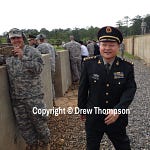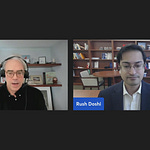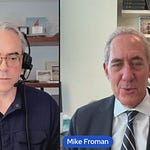Episode Notes:
Today, we're going to talk about US-China relations, the upcoming Sixth Plenum , Xi Jinping, and what we might expect for the next year heading into the 2022 20th Party Congress among other topics. I'm really pleased that our first guest for the Sinocism Podcast is Chris Johnson, CEO of Consultancy China strategies Group, senior fellow at the Center for Strategic International Studies and former senior China analyst at the Central Intelligence Agency.
4:45 on US-China relations - I think their assessment is that it's working. In other words, by maintaining that sort of very strict line, they've gotten Madam Meng of Huawei fame home. They've gotten the trade discussions going again. They've got the US saying, "Well, we might lengthen the timeline for you to implement phase one." In other words, it's working from their perspective.
13:30 on the 6th Plenum - The first I think is that, it would represent, I think the net evolution in what I call Xi Jinping's further development of his leadership supremacy. And, I use those terms very deliberately because often times, the shorthand we see in describing this as references to Xi's consolidation of power. Well, in my mind that took place very early on in his tenure.
30:00 on the economy and heading towards the 2022 20th Party Congress - Equally important in my mind is how little the leadership and the economic technocrats seem to be rattled by that fact. In other words, we're not seeing the stimulus wave. We're not seeing monetary policy adjustments in a significant way. There's a lot of study as she goes. And, that could change. We've got the central economic work conference, obviously in December, which will give us a sense of how they're thinking about next year. But like so many other things, I think we as watchers and the investment community and others, we're slow to sometimes break with old narratives. One of which is you must welcome a party Congress with very high growth. And every signal coming out of the leadership is that, they're not playing that game anymore. I think that's fairly strong.
37:00 On US-China relations - I think if you're a senior US policymaker, your working assumption has to be that China's more likely to get it right than to get it wrong, even if they only get it 30% right or 40%, something like that…Chris Johnson:
Xi is here and will be here for the foreseeable future. And therefore there won't be any change in the policies largely that he's articulated.
Links: More about Chris Johnson and his China Strategies Group here.
Transcript:
Bill Bishop:
Today, we're going to talk about US-China relations, the upcoming Sixth Plenum , Xi Jinping, and what we might expect for the next year heading into the 2022 20th Party Congress among other topics. I'm really pleased that our first guest for the Sinocism Podcast is Chris Johnson, CEO of Consultancy, China strategies Group, senior fellow at the center for strategic international studies and former senior China analyst at the Central Intelligence Agency. Welcome, Chris.
Chris Johnson:
Great to be here, Bill.
Bill Bishop:
Chris, welcome. I think today, what I really like to start out with is just an overview where you see the state of US-China relations and how the new administration, I mean it's 10 months now or thereabouts, but how the new administration is doing and how the Xi Jinping administration is reacting.
Chris Johnson:
Great. Yeah. Well, it's obviously a unique time in US-China relations. I guess, if I had to characterize it in a phrase, I would say, things are a bit of a mess. I think, if we start, it's useful to start at a sort of high order level and then work our way down in terms of thinking about the relationship. So I think at the highest order, one of the things that strikes me is that arguably for the first time, since normalization of relations, really, we're in this strange position where I think both countries, both leaders and perhaps increasingly, even both peoples, aren't overly keen to engage with one another.
Chris Johnson:
I think, we've had times in the past during the last several decades where maybe one side or the other was feeling that way, but not both. And the sense that I get in terms of the leader to leader view is, both Xi Jinping and President Biden are kind of looking at each other and saying, "I've got a lot going on at home. I'm very focused on what's happening domestically. I know the other guys out there and I need to pay attention to what he's doing, and right now it's all just his. But, if I can kind of keep him at arm's length, that's okay with me." And I think we're kind of seeing that really on both sides of the fence.
Chris Johnson:
I think for Xi Jinping, it's a little more intense in that it's hard to see where the good outcomes are for him and trying to lean in toward the relationship and so on, because he's kind of getting what he wants to some degree without doing. So, as to your question about how the administration is doing, I think to be fair, I think we have to say probably about as well as they could given both the domestic constraints, what we might call China's own attitudes and approach toward the relationship right now.
Chris Johnson:
On the domestic side, by constraints, I mean, the administration from my perspective seems to have an almost neurologically fearful stance of being seen as weak on China. Obviously that comes out of four years of the Trump administration and its approach toward China, stories and tales and recreations of history about how engagement was a failure and how the Obama administration was somehow a main sort of group that failed to understand the reality of the relationship and therefore blew it and a lot of those people are back now. And I think that contributes to this fear. And I think the practical impact of that is that, it's inhibited the administration from doing what I think they need to do, which is to have sort of an objective racking and stacking of what they believe China's global ambitions actually are. And then I think critically beyond that, which of those ambitions the US can live with, because in my assessment, we're going to have to live with at least some of them.
Chris Johnson:
And then to be fair to the administration, I think that same needed exercise has been hamstrung by China's own approach, which at least so far, I think we could probably characterize as an unflinching resistance that the US must adjust it's as they like to call it hostile attitude, if progress is going to be made. And, it's my sense that there's really little chance of progress of China's unwilling to move off of that stance. But at the same time, I think their assessment is that it's working. In other words, by maintaining that sort of very strict line, they've gotten Madam Meng of Huawei fame home. They've gotten the trade discussions going again. They've got the US saying, "Well, we might lengthen the timeline for you to implement phase one." In other words, it's working from their perspective.
Bill Bishop:
And, they presented two lists to Deputy Secretary of State Sherman. And, it certainly seems like there are some of the things on that list that are being worked through. To follow up though, what do you think the administration is doing around Taiwan? Because it seems like over the last couple of weeks, we've had quite a push from Secretary of State Lincoln and others on Taiwan and sort of whether or not it's giving them, returning them to the UN or in a seat or at least giving them more participation in UN bodies. What do you think is driving that and what do you think realistically, the administration believes the outcome's going to be because it certainly seems to be touching the most sensitive point on the Chinese side?
Chris Johnson:
Yeah. Well, my sense of it is that, regardless of the administration's intention, and I'm not entirely sure what the intention is, the results in Beijing are the same, which is to say that there would be a perception there that the US is unilaterally making a change to what they see as the cornerstone of the bilateral relationship, which is the US adherence to the One China Policy. And, if you're sitting in Beijing's shoes and you're hearing, you're seeing things in the press, you're hearing the president himself say, "Well, we will defend Taiwan." Oops. We didn't mean to say that, but it wasn't, but I didn't misspeak, and these sort of things, and a lot of that has to do with the domestic. Look, the Chinese have never doubted that the US would probably mount some kind of a defense. So, it's not really that issue if the Chinese were to attack. It's the accumulation of what they see as salami slicing erosion of the US commitment to the One China Policy.
Chris Johnson:
And so in my mind, the only relevant element here is not really the motivations, but what's going on in Xi Jinping's mind. Can he see all of this activity and basically respond by making the appropriate judgment about this erosion in the One China Policy and then quietly taking the appropriate adjustments on war planning and on other things? Or does he feel that with the accumulation of these things, whether it's the debate over whether or not to break with strategic ambiguity, changing the name of Taiwan's defacto embassy in Washington, all these sort things, does he feel that he needs to do something demonstrative now to kind of reset the balance, which was really the motivation behind their military exercises in 1995, '96, for example, when [inaudible 00:07:53] came to the United States?
Bill Bishop:
And of course back then, they had far less capability as they do now. I mean, certainly, I've heard different things and looked at different reports, but it does sound like the PLA has advanced quite rapidly around in areas that they would be able to bring to bear, to deal with Taiwan from their perspective. And that the US, I think is ... One of the things I worry about is just that there's certainly in some quarters in DC, it seems like there's a belief in the US military power that may not be fully rooted in the new realities of the sort of PLA modernization campaign that really has, I think, dramatically accelerated and did much more efficient under Xi Jinping.
Chris Johnson:
Yeah, definitely. And primarily to the degree, there's been a chief innovation under Xi's leadership. They've finally taken the steps to address what we might call the software issues. In other words, the technology, the hardware, the shiny kit has been being developed since that '95, '96 period. And they've got some very interesting and capable systems now. But the software, the ability to actually conduct joint operations, these sort of things was always a fall down point for them. And then massive restructuring of the PLAs force structure, much along the lines of sort of Goldwater-Nichols that Xi launched early in his tenure is now bearing a lot of fruit and making them more capable from that sort of software side of things as well.
Bill Bishop:
And that restructuring, that was something that the PLA or that they talked about doing before but had never, no other leader had been able to push it through.
Chris Johnson:
Correct.
Chris Johnson:
Even Deng Xiaoping, who himself tried to do sort of a similar restructuring in the aftermath of Tiananmen and in the aftermath of the Yang period.
Bill Bishop:
That's interesting. I remember we talked when she convened the second Gutian meeting with all the generals that look clearly in retrospect was the kickoff to I think, a massive corruption crackdown inside the PLA.
Chris Johnson:
No. I call it political shock and awe which was the twin aspect of force restructuring and the anti-corruption campaign in the military, which basically the back of the PLAs political power in the system from my perspective.
Bill Bishop:
Interesting. So, well now moving on to politics, we have the Sixth Plenum. That starts in on the 8th of November, I believe. Can you talk a bit about why those plenums are important and what might be especially interesting about this one? Because, one of the things that we keep hearing about, and certainly there are rumors, but there's also, I think, some certainly the way they describe the agenda for the plenum in the official Xinhua release a couple weeks ago. It sure sounds like they're going to push through a third historical resolution.
Chris Johnson:
Yeah. No, my sense is that's a forgotten conclusion pretty much at this point. To your first question about why plenums are important. In my mind, I think they're employing both mechanically and substantively. Mechanically, having one once a year, since the reform and opening period started really, and really per the requirement in the party's constitution, that happened once a year. That has been fundamental, I think, to signaling both domestic audiences and international audiences that things in China are relatively stable. So, just look at the brouhaha that that occurred, for example, in this current central committee cycle that we're in the 19th central committee where Xi Jinping snuck in effectively an extra plenum early in the process in early 2018 to get the changes to the constitution about term limits put out there, which then meant they had to advance the third plenum from its normal position in that fall, after a party Congress to the usual second plenum, which manages the national people's Congress changes, personnel changes and so on.
Chris Johnson:
And then, a perception that the fourth plenum therefore had been delayed because it was more than a year before it actually took place. And you'll recall as well. And we talked a about it at the time, all the speculation. Oh, this means Xi Jinping's in trouble and so on and so forth, non-sense from my point of view. So, that's the mechanical aspect.
Chris Johnson:
Substantively, obviously I think they're important because outside of the political work report that the sitting party general secretary delivers at the five yearly party congresses, the decision documents as they're usually called that come out of the plenums really reflect the most authoritative venue for the party leadership to signal their priorities, their preoccupations and the policies, of course. And of course, there have been some very important plenums in the party's history, most notably the third plenum of the 11th central committee, which at least the official version is that's when reform and opening was launched. There's a lot of debate about whether that's true or not.
Chris Johnson:
But, turning to the upcoming six plenum, I think they have made it, as I said, a moment ago, pretty clear that there will be a history resolution. Obviously, there's only been two previous ones in the history of the party. One in 1945 and the other by Mao Zedong and the other in 1981 from Deng Xiaoping, largely closing the book on the mount period, and the culture revolution and so on. So from my perspective, if they do do it this time and I think they will, it it's important for several reasons. The first I think is that, it would represent, I think the net evolution in what I call Xi Jinping's further development of his leadership supremacy. And, I use those terms very deliberately because often times, the shorthand we see in describing this as references to Xi's consolidation of power. Well, in my mind that took place very early on in his tenure.
Chris Johnson:
I think, he's been there for a good long while. And so, this is just about further articulating his leadership supremacy. And indeed I think, his genius really from the beginning was to frame the party's history in these three distinct eras, each roughly 30 years from the founding of the PRC to Mao's death, Deng's reform, an opening period, and now Xi Jinping's so-called new era. And in fact, I think his signature political achievement, among many political achievements that he's had, has been to canonize that framing these three epics under the banner of Xi Jinping thought with on Chinese characteristics for the new era, so long I can never remember. Let's just call it Xi Thought for shorthand. Yes. And I think, he used it to both effectively erase his two immediate predecessors Jiang Zemin and Hu Jintao from history, which is important and also simultaneously to vault past Deng Xiaoping in the pantheon of ideology by getting the autonomous thought. And of course, the next iteration will be to truncate Xi Jinping thought for horribly long name.
Bill Bishop:
Well, and there are multiple variants. There's thought on diplomacy. There's thought on economics. There's thought on law.
Chris Johnson:
All of that. And I think, the other thing is this ideological crowning, obviously, the significance of it lies in the codification and probably the legitimization then of the sum of all of his actions and pronouncements since he came to power and the equating of those developments and those statements with the party's line. And as you and I have discussed many times, to criticize Xi now then is not just to attack the man, but to attack the party itself. That's very dangerous. And if you're going to do it, you better get it right.
Bill Bishop:
To that point, isn't that part of his political genius, because he must have, that must have been by design, right?
Chris Johnson:
Oh, absolutely. It was completely by design and there was a reason I think why Xi, amongst recent leaders, was the one who, if you spoke to people for example, in the party, the central committee department for party history research, they would say when he was vice president leader in training, he actually cared about party history. Jiang and Hu didn't really care, or at least it wasn't a priority for them. It was very meaningful for Xi Jinping, I think for those reasons. And so, this new history resolution, I think, is important in helping him continue this process toward the next revolution, which is to truncate Xi Jinping thought.
Chris Johnson:
I think, in terms of the substance of a new resolution, it's my sense that there's a tension, not just in Xi's mind, but perhaps in the leadership circles of the people who are working on this thing, between a desire to make that document, only celebratory and forward looking, in other words, why the new era is so amazing versus a desire to tidy up, if you will, some of the bits from history that he doesn't like with criticism, which of course in a very similar fashion to say, Deng Xiaoping 1981 when criticizing the excesses of the cultural revolution. So in my mind, there's two aspects where that criticism could come to the fore, which are very valuable. The first is, will he do in effect to Deng what Deng did to Mao, which is to criticize the excesses of Deng Xiaoping's reform and opening policies.
Bill Bishop:
Which would be including criticizing then at least indirectly Hu and Jiang who are still alive.
Chris Johnson:
Well, we'll come back to that in a minute because I think it's a separate animal, but on the reform and opening piece, it very much relates obviously to common prosperity, to the new development concept. I'm seeing right over the last several months, but I think there's a separate aspect from that kind of economic excesses. There is this line. It was a very fascinating. You never want to put too much emphasis on one piece of propaganda, but I believe it was the 24th of September, People's Daily had their latest iteration in the Xi Jinping thought question and answer series. And, it was about kind of party leadership and so on and so forth. And there was a fascinating line in there in my mind, which was the quote was especially after the 18th party Congress in view of quote, the neglect dilution and weakening of the party's leadership for a period of time.
Chris Johnson:
Now, what period of time is he talking about? He's talking about the tenures of Jiang Zemin and Hu Jintao. So once again, further re-raising them from history, boosting his own stature and creating a justification for him to certainly rule for a third term. And, who knows beyond that?
Bill Bishop:
And, having a historical resolution, the third one then really does create the third era, right?
Chris Johnson:
No. It formalizes the kickoff, if you will, of that new era. Yeah.
Bill Bishop:
And that's why, I struggle with sort of lots of the rumors. Xi's weak. Xi's up or he's down or there's the latest one is he won't travel abroad because he is worried about a coup. "Hey, it's Chinese politics." Maybe it's true, but it seems a little bit of a stretch to me. But, I look at, again, back to his ... You hear lots of things. And certainly, when I was in Beijing and sort of the, probably not now but back then, the Beijing chattering class. He was never the smart guy. He was always kind of slow. And yet, here we are. And here he is. And so I think, he may not be the best educated of Chinese leaders in some formal perspective, but he certainly seems to be as politically savvy as Deng or Mao.
Bill Bishop:
I mean, he certainly seems to have surpassed Jiang and Hu, but I think one of the things too, back to this question of, is he weak or will he be around? What's going to happen to the 20th plenum? One of the things I go back to is, when he got, Xi Jinping fought and appended, whatever you want behind it, it's a 19 party congress. Doesn't that basically mean though, that as long as Xi's alive, he's kind of the man? [crosstalk 00:20:16] Even, if someone else has the job title, unless the party changes his line and gets rid of Xi's thought, which seems like it would be extremely difficult for a whole bunch of reasons, ultimately as long as he's breathing, isn't he caught up kind of running the show.
Chris Johnson:
Yes.
Bill Bishop:
Or, is that too simplistic?
Chris Johnson:
Very much the case. And in fact, again, his interest in not just Chinese communist party history, but the communist movements history, you can have no Khruschev secret speech. If you do these sort of things, at least while he's alive, to your point. And I think, that's a very important aspect of what he's trying to do here. He's creating the conditions for him to be able to engage in, to steal Barry Naughton’s term for the economy, grand steer edge of the entire system, and I think, that's a very, very important aspect. And just to your point on the intellectual stuff, because I think it's important, there's a difference between book smarts and political street fighting skills. And probably, his education was disrupted. So probably, he may not be God's gift to intellect, but there's no question in my mind that from a political acumen point of view, he's a genius, a tactical genius.
Bill Bishop:
And, if you think about what his primary book education was when he was in his most formative years, it was Mao thought.
Chris Johnson:
Yeah. No, definitely. And, I just want to come back to that too, because I think it's so important on what could be the meaning, if you will, of this new history resolution, which is that Xi Jinping clearly has a problem with the period of the nineties and what I actually like to call the early naughties in both of their-
Bill Bishop:
Otherwise known as the Go-Go Years..
Chris Johnson:
and being naughty. Yeah. The wild west days. And I think, he feels also that the period in the run up to when he took power ahead of the party Congress in 2012, he in many ways saw that as the period of maximum danger for the party. And so, this will be criticized. There's no way in my mind there won’t be some mention of our friends Bo Xilai,and the characters that were purged at that time, maybe not specifically, but in the sideline propaganda and so on, I'm sure will come up.
Bill Bishop:
So, because one thing when you talked about the resolution, I mean, and what will be in it and sort of how do you balance the sort of criticism or judgment on the past 30 years with forward looking, I found it interesting in yesterday's People's Daily. I had it in the newsletter yesterday, was that very long piece by the sort of the pen name for the People's Daily theory department on Chinese style modernization, which was very forward looking, but also very global looking in terms of talking about how China has created this new style modernization and how it can be a sort of applicable to other countries. And so, tying that back a little bit to your earlier comment about sort of trying to understand, as you said, the administration's rack and stack, how do we sort of go through what we think they're global, the PRCs global ambitions are and what can we live with what we can, what do you think their global ambitions are?
Chris Johnson:
Well, there are a series of them in their region, certainly, and we can talk. There's endless debate about whether it extends globally and if so, on what timeline, but they certainly want to be seen as a major superpower. No question. I often like to say that their goal in the region certainly, and I think increasingly globally, is that they want countries when a country is thinking of doing something significant in terms of its policies, the leadership and Xi Jinping himself would like that country's leadership to think about how Xi Jinping's going to react to this in the same moment that they think about how will the US react to this? That's what they're after.
Chris Johnson:
And in my mind, as to whether it is a desire to subvert the rules based global international order and so on, I'm much more skeptical, I think, than a lot of our colleagues on that in part, because implicit in that is this notion of them sitting around in the Politburo meetings, stroking long beards and looking 50 years into the future. They have an inbox too, and they're not infallible nor are they press the end all the time. And, I just think that, it's too much of a teleological view, from my point of view, but that's certainly one of them.
Chris Johnson:
And I think, this ties to the history resolution bill, because, Xi, in my mind, needs or wants kind of three things from that. The first is, he too needs to create a justification for staying in power. The reality is, no one can stop what he's trying to do next year, or at least that's my opinion, but what they can do is build leverage for the horse trading for all the other positions that will be in play. If he can be criticized, as someone I spoke to about this situation put it to me, even Mao had to launch the cultural revolution to take control over the party again. In other words, even someone of his stature had to do that.
Chris Johnson:
Second, and it touches on what we were just discussing is his obsession with China breaking through the middle income trap to further prove the legitimacy of the country. And that means breaking from the old economic model. And third, also relevant to our comments just now is, he sees all of this as intimately bound to what we might call the global narrative competition with the US. In other words, if he can be seen as breaking through the middle income trap, doing a better job than the west on income and equality and so on, he sees that paying tremendous dividends for elevating China system.
Bill Bishop:
At least so for on dealing with COVID. It's paid dividends.
Chris Johnson:
Absolutely. Yeah. And, indeed further legitimizing the notion that they have found some third way between capitalism and socialism that not just works for them, but increasingly could be exportable.
Bill Bishop:
Right. So, it's not like everyone has to become a Marxist, Leninist exactly country, or people's dictatorship, but we have this China, this China solution, I think they call it. And certainly, one thing that's interesting too, I think is, and it hasn't gotten a lot of attention yet in more mainstream media, is this global development initiative that she announced at his speech to the UN in September, which now he is regularly bringing up in his calls with developing countries.
Bill Bishop:
And, it looks to me like it's effectively taking, it's a way of packaging up their lessons from the poverty alleviation campaign that they declared victory in early this year, and trying to take that global. And quite honestly, the world needs more positive development and if China's offering something that's reasonably attractive in the US or Europe isn't, then how can the US criticize these countries for signing onto it?
Chris Johnson:
No. I'm mean, increasingly, we always want to say, "Well, nobody wants to sign on to their model" or "It doesn't work in other places", but increasingly, what's the narrative that they're touting? One of it is, "Hey, we brought X hundred million people out of poverty." That's very attractive to some other countries. We have a system that works. We have a system that is tolerant of various and sundry approaches, doesn't insist that you change your governance structure or that you support human rights or avoid graft, and things like this. It's very attractive. But the global development initiative, I think in my mind, increasingly, it's sort of an agglomeration of the BRI aspects. And then, there's been so much attention of recent weeks about, particularly Wang Huning's dream weaving of cultural hegemony and all of these sort of//.
Bill Bishop:
I think people are a bit overindexing a bit on Wang Huning. [crosstalk 00:28:22] important.
Chris Johnson:
I know they are. I mean, the line I like to use is they're confusing the musician with the conductor.
Bill Bishop:
Okay. Oh, so you must be up to date on Xi Jinping thought on music. That's good.
Chris Johnson:
Exactly. Eventually.
Bill Bishop:
So, I mean, back to the plenum, moving forward from the next year to the 20th party Congress. I mean, normally, the year before a party Congress is a very, very politically sensitive and difficult year where you have the entire system is geared towards the party Congress and basically one not screwing up. And two, anticipating where the people or persons making the decisions on promotions want you to go in terms of policies. And so, in some way, usually it kind of freezes the system. Is there some risk of a fairly difficult year with China? Because, you've got clearly the economy is, I don't want to say struggling, but it's clearly not doing as well as they hoped.
Bill Bishop:
They seem to continue to be pushed pretty hard on the third tough battle of reducing financial risks. And specifically, I think evergrande is the poster child of that right now. But, what do you think she believes needs to happen over the next year? And what do you think that means for sort of the stuff, a lot of investors feel worried about around real estate, common prosperity? I mean, it just feels like for the first time in a while, things on the economic side at least look a little bit rickety right now.
Chris Johnson:
No. I agree with that general assessment. Equally important in my mind is how little the leadership and the economic technocrats seem to be rattled by that fact. In other words, we're not seeing the stimulus wave. We're not seeing monetary policy adjustments in a significant way. There's a lot of study as she goes. And, that could change. We've got the central economic work conference, obviously in December, which will give us a sense of how they're thinking about next year. But like so many other things, I think we as watchers and the investment community and others, we're slow to sometimes break with old narratives. One of which is you must welcome a party Congress with very high growth. And every signal coming out of the leadership is that, they're not playing that game anymore. I think that's fairly strong.
Chris Johnson:
This also comes back to the issue though of what I mentioned earlier about the politics. It's been quite striking to me given what a momentous occasion is happening next year, how little in the analysis of the crackdowns, the tech lash, these sort of things, property sector, how little attention's being paid to the political dimension. So for example, if you look at sort of this issue that I raised a moment ago of the danger for Xi is not someone's going to stop him or unseat him, but this issue of ... I think, my sense is he views the model of the changeover next year as being the ninth party Congress where I believe there was something like 80% turnover in the central committee.
Bill Bishop:
This was the 1969 during the middle of the cultural revolution.
Chris Johnson:
Yeah, in the midst of cultural revolution.
Bill Bishop:
And, the eighth party Congress was not five years before it was. There was quite a gap.
Chris Johnson:
Yeah. Huge gap. Yeah. And so, if he would like to sweep away that kind of level of changeover, that means getting rid of a lot of the dead wood of the other constituent groups, let's call them. And I think, his ability to do that is closely tied to whether they can criticize and what are the KPIs that he has put out for himself for this current term, and you just raised them. It's poverty alleviation, environmental improvement, and "guarding against financial risk". I think, we can say on the first two, he's done very well. On the third, it's a bit of a disaster.
Chris Johnson:
So the message, and I'm told that this was sort of some of the discussion on the margins of Beidaihe this year was that, you've got a year or arguably eight months because of the way the system does these things to get that grade on financial risk from a C-, D+ to an A, and poor Liu He in the role of having to figure out how to make that happen operationally. And I think to your point, oftentimes, we do get that paralysis as everybody's kind of looking over their shoulder. But if anything, I think these guys are more inclined to show they're overfulfilling the plan, if you will, in terms of representation and implementation. So, the risk in my mind is not that the various crackdowns will calm down or smooth out, it's that in their zeal to look like they're doing what the boss wants them to do to hopefully be promoted, they might badly over correct. And that I think, has applications for how they handle Evergrande and many of the other associated crackdowns.
Bill Bishop:
That's an interesting point. And, one of the things I wonder about because it just seems like she has been quite skillful at finding opportunity and what looks like messes. And, if we're looking at an evaluation in the last 30 years, sort of the historical resolution idea, certainly there's a lot to criticize about the economic model. I mean, they criticize it on a regular basis in terms of trying to transition the new development concept. It's an effectively saying the old model doesn't work anymore. And, one of the biggest problems we created was this massive debt problem for China. Is there a cynical way of looking at it and saying, "Okay, if we have this, we being sort of see the top of the party, we have a fair amount of confidence because we've done a lot, so much work on hardening the system and the stability maintenance system that we can tolerate more stress than people think"?
Bill Bishop:
And, by letting these things get really stressed, does that help remove some of the dead wood in terms of sort of surfacing officials who might be promotable to actually look like they were somehow culpable for some of the decisions that led to things like ever grand or some of these other messes, and then that clears the way for other personnel moves?
Chris Johnson:
I think, that's certainly part of it. I think, that might be adopting to sort of micro of a frame on it. I think where it's important is, from the perspective of, again, this is Xi's political genius, from my perspective, is the layering of these narratives in the buildup toward a major change or a major development. So, why in the depths of the trade war? Did you start talking about a new long march? And hardship and sacrifice and all of these things, they're preparing the ground. In some reason, why are they maintaining a COVID zero approach? There's lots of reasons. But one of the reasons in my mind is if indeed you feel you must fundamentally break with that old, dirty economic model, which was largely export led, and you want dual circulation to work and you want these things, why not keep the border closed and force the system to transition because it must?
Chris Johnson:
So, there's a number of these things where I think, again, I don't like to claim that it's all some master plan, but I think there's a lot of thought that's gone into some of these things.
Bill Bishop:
But clearly, things like the energy crisis, I mean, they clearly have ... There are a lot of moving parts that can blow up pretty quickly. And so I think, to your earlier point, the politics are always in command in China. I think they're more in command now, but it does just feel like the risks or the downside risks on the economy are greater than they've been in a while.
Chris Johnson:
Yeah. I mean, my sense is, again, what do the officials and particularly the economic technocrats see as the greatest risk? I think they think the great as risk is overdoing it, not underdoing it at this stage.
Bill Bishop:
Interesting. So, well, thanks. Anything else you want to talk about?
Chris Johnson:
No, I think I kind of covered the waterfront. I mean, I guess in summation, I would just say and it maybe kind of comes back nicely to US-China relationship and so on. Discussing what we've just been discussing, I think if you're a senior US policymaker, your working assumption has to be that China's more likely to get it right than to get it wrong, even if they only get it 30% right or 40%, something like that.
Chris Johnson:
Xi is here and will be here for the foreseeable future. And therefore there won't be any change in the policies largely that he's articulated. And if we have those as our working assumptions, I think we will find ourselves framing a better policy. And I guess, if it doesn't go that way, you could be "pleasantly surprised" or whatever you want to say. But is it really a pleasant surprise if you have a leadership crisis in China?
Chris Johnson:
I mean, this is another thing I think just in conclusion that I find very striking in the absence of information. And I think, one of the challenges for us as watchers, when a collective leadership system like we had before goes away, each one of those collective, all seven or nine, depending on the timeframe of the standing committee members, they all had coteries under them and so on and so forth. In other words, there was a lot of places to tap in to get insight and compare notes. And so, with Xi Jinping, it's a very small circle, clearly. Even Kurt Campbell and other US officials have discussed their frustration with not being able to get in the inner circle.
Chris Johnson:
And therefore, people just find themselves going to these memes such as, well, they're will inevitably be a succession crisis when Xi Jinping leaves the scene. In my mind, the biggest opportunity for a massive succession crisis in the history of the PRC was Mao's death. And yet, they managed to find a way largely through Deng Xiaoping. But I think in general, because there was a collective understanding that this whole thing's going to unravel if we don't get it together, China's not so worried about that, nor am I worried about an imminent invasion of Taiwan, but that's probably another podcast.
Bill Bishop:
That was a whole different podcast. And so ... No. Well, look, thank you so much. It's really great as always to talk to you. And, I do hope I can get you back on as a guest at some point.
Chris Johnson:
Always glad to do so. Anytime, Bill. And, your newsletter in my mind is the best thing out there in terms of keeping me up to speed and subsequently informed every day.
Bill Bishop:
Thank you. I didn't pay him to say that just to be clear. But, great. Thank you, Chris.










